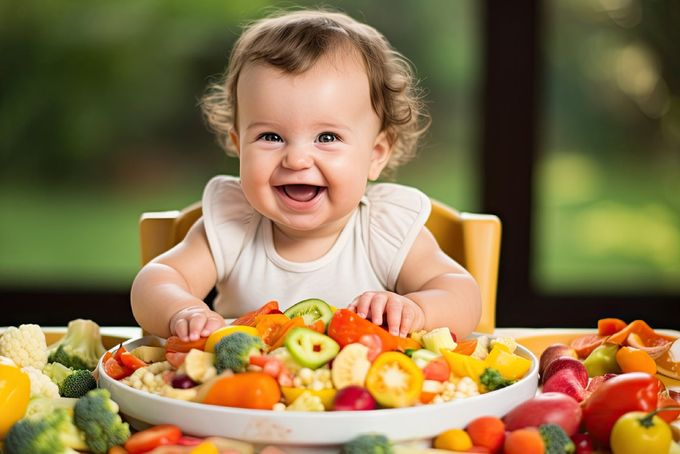Healthy Eating Habits for Toddlers: Food Relationship
Updated October 11, 2024

Good nutrition practices have a direct impact on their physical health. Toddlers are in a vital stage of growth and development, and their food is critical in providing the nutrients they need to support this process. Fostering a positive relationship with food enables a balanced and nutritious diet, contributing to their general well-being and healthy development.
Early life eating behaviors and attitudes persist into adulthood, so it is important to start early with healthy eating patterns. That will help build the groundwork for lifetime healthy eating habits that will shape future health to lower risks for obesity, diabetes, heart disease, and others.
A healthy relationship with food can also assist your toddler in developing a positive body image and self-esteem. We are born with intuitive Ihunger and fullness cues, which parents and caregivers can negatively affect by not eating little ones responsively or not paying attention to the child's willingness to eat or stop eating. This can help prevent the emergence of disordered eating practices and negative body image issues.
Finally, eating is a major source of fun, excitement, curiosity, and social contact. Meals allow for family bonding and the acquisition of social standards and politeness. When you eat regularly with your child, introducing them to various foods, textures, and flavors, you broaden their palette and help them be receptive to trying new foods.
Decision-making: Parents vs. Toddlers
One should remember how important It is to balance a toddler's autonomy and a parent's direction while establishing good dietary habits for toddlers. Understanding the 'division of duty' in feeding, which delineates distinct duties for parents and children in the eating process, can help achieve this balance.
Your primary responsibilities as a parent or caregiver include determining what, when, and where to offer nutritious foods. From the family dinner, you should offer a selection of safe foods, giving your child a variety of flavors and sensations. This exposes your youngster to a wide range of meals and aids in developing a palate for healthier selections. It is important to remember that it is not just about what they eat but also how they eat it - preparation with little or no extra salt or sugar is recommended.
It's also important to know when to offer meals. You can help your child understand and anticipate meal times by providing food at the exact times each day. This regularity can also help them regulate their metabolic rhythms and appetite.
The "where" refers to the setting in which meals are presented. Eating as a family teaches healthy meals, and having a peaceful, distraction-free meal atmosphere can encourage mindful eating.
While parents are responsible for these tasks, the toddler's responsibility is to determine whether or not to eat and how much to consume from the items available. This is where the toddler's independence comes into play. A child usually eats intuitively. Allowing your toddler to respond to hunger and fullness guidelines will help them maintain their sense of intuitive feeding. It's critical to respect your toddler's appetite; they'll tell you whether they're hungry or full.
If your child doesn't want to eat a particular food or meal, respect and accept that decision. Putting pressure on a youngster to eat can result in lousy food associations, and using food as a reward or punishment can contribute to an unhealthy connection with food.
However, parental action is required in some situations, and you need to help your toddler. If your child consistently declines a specific type of food (such as veggies), keep presenting it to them because it can take more than ten tries for a youngster to learn to appreciate a dish. Please, remember not to force your child to eat.
Day-to-day Changes in Toddler's Appetite
A toddler's hunger can be as erratic as their mood swings. Their hunger levels fluctuate daily, just like good and bad days. This variation in appetite is a typical aspect of their development, and parents need not be concerned.
The crucial point to remember is that a toddler's hunger is tightly related to their rate of growth and activity level. They may have a larger appetite and consume more food during rapid growth or activity periods. Conversely, they may consume less if they are in a slower growth period or are less active. These appetite changes can occur on the same day. For example, your kid may have a substantial breakfast and lunch but pick at their dinner.
Toddlers are also learning to listen to their bodies. They are learning to recognize when they are hungry and satisfied. This is an essential component of building a positive connection with food. As a result, it's normal for your kid to eat a lot one day and less the next. These oscillations allow children to recognize and respond to their bodies' hunger and fullness tips.
While respecting your toddler's appetite, it is also critical to ensure that what they eat is nutritional. Even if your child needs to eat a lot, ensure they eat healthful foods. Please respect their decision to eat less, but make sure what they do eat is nutrient-dense.
Concerns Over Several Days of Low Appetite
As long as your child seems generally happy and healthy and their growth is normal, a few days of reduced eating should not be a cause for concern.
When a child doesn't eat as much as usual, they often make up for it at the next meal or even the next day. It's suggested not to offer other foods as rewards or force them to eat, as this can teach children not to listen to their appetites. Instead, you can offer a variety of healthy food choices and let your child decide how much to eat.
However, if your child's reduced eating persists for an extended period or shows signs of weight loss, fatigue, or other concerning symptoms, it is recommended to consult a healthcare professional. This can help rule out potential health issues and provide personalized advice tailored to your child's needs.
In conclusion, a few days of reduced eating in a toddler may not be alarming if the child is otherwise healthy and active. Maintaining a consistent eating routine, offering a variety of foods, and respecting your child's appetite can help manage such phases. However, ongoing concerns about your child's dieting routines should be discussed with a healthcare professional to ensure the child's nutritional needs are being met.
Overeating and Undereating Tendencies
A toddler with an overeating tendency can be guided toward healthier food behaviors using a variety of strategies:
- One approach is to offer slightly smaller portions of food. If the child finishes it, a small second helping can be provided, which gives the child's brain and tummy a chance to register fullness.
- Serving food on a smaller plate can also be beneficial, as this can still give the feeling of a "full plate".
- It's also crucial to minimize distractions, like TV or toys, during mealtimes to help the child focus on their appetite.
- Offer your child a variety of healthy foods, involve the child in meal preparation, and set a regular meal and snack routine can further encourage healthier eating habits.
For a toddler with an undereating tendency, regular meal times can help build a consistent routine that aligns with their natural hunger. Encourage them to eat more at mealtimes by ensuring you serve small amounts at snack times, as this can help build their appetite for main meals. One small snack between regular mealtimes can provide an energy top-up, especially if the child has been active. If the child doesn't eat a meal, avoid offering alternatives, which can encourage picky eating. It's important to remember that a child's appetite can fluctuate and that they may have a small appetite. Again, involving them in meal planning and preparation and providing various healthy, appealing options can encourage them to eat more. Regular family meals can also offer a positive role model for eating behaviors.
Note: This information is based on general recommendations and might not cover all situations. Please consult a healthcare professional for advice tailored to your child's circumstances.
Improving Your Toddler's Food Behaviors
- Maintain Consistent Meal and Snack Times: Consistency can enhance your toddler's natural hunger tips, encouraging a healthier mealtime appetite.
- Provide Variety: Offer a variety of age-appropriate nutritious foods, exposing your youngster to new flavors and textures. Fruits, vegetables, whole grains, legumes, and dairy or appropriate plant-based alternatives are all included.
- Serve Family Meals: Eating as a family sets a beautiful example for healthy eating. Your child will learn by seeing you eat and appreciate different cuisines.
- Create a Relaxed and Calm Eating Environment: Remove all distractions, including television, tablets, and phones. This lets your youngster eat mindfulness and respond to hunger and fullness guidelines.
- Allow Your Toddler to Explore: Allow your toddler to use their fingers to touch, smell, and eat food. It's okay if things get a little sloppy. This tactile inquiry is essential to learning and might spark an interest in eating.
- Encourage Self-Regulation: Allow your child to choose whether or not to eat and how much. This can help kids develop a healthier connection with food by letting them recognize their hunger and fullness cues.
- Using food as a reward or punishment can lead to an unhealthy relationship with food. Instead, emphasize positive eating habits.
- Include Your Child in Meal Preparation: If your child assisted in preparing the food, they are more likely to enjoy it. This can also be a fun playground to build self-esteem.
- Maintain Healthy Food Options Accessibly: Keep a dish of fresh fruit within easy sight and reach. Stock your cupboard and refrigerator with a variety of healthful, nutritious foods.
- Patience and persistence may be required before your youngster learns to love a new meal. Continue offering various foods, including those your youngster has previously rejected. Throughout this process, remember to be patient and encouraging.
Conclusion
In conclusion, fostering a positive relationship with food and establishing good eating habits in toddlers is crucial to their growth and development. Parents and caregivers play a significant role in shaping these habits, from deciding what, when, and where to serve meals to creating a relaxed eating environment. Understanding and respecting a child's appetite fluctuations and feeding cues is critical. At the same time, it's essential to remember that toddlers have their role in this feeding relationship, deciding whether to eat and how much.
Toddlers often try to make healthy decisions, but as a parent and caregiver, it's important to remember that their willingness to eat, food likes, and dislikes are sometimes connected to emotional problems.
Let your as well as your toddler's intuition work.
The content and advice provided in this article are for informational purposes only and are not a substitute for medical diagnosis, treatment, or advice for specific medical conditions. Always consult a pediatrician to understand the individual needs of your child.











